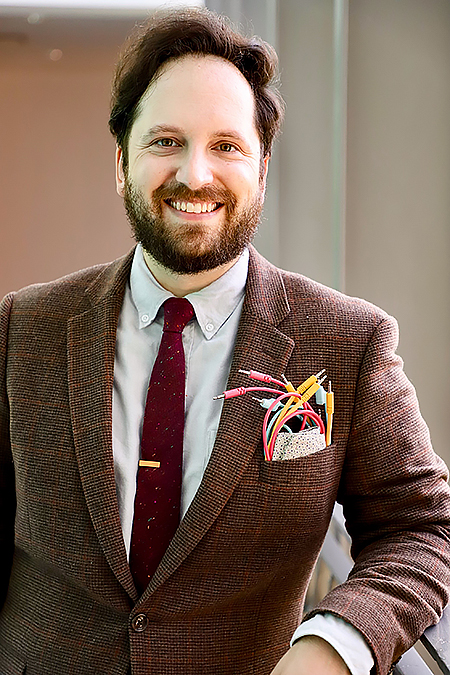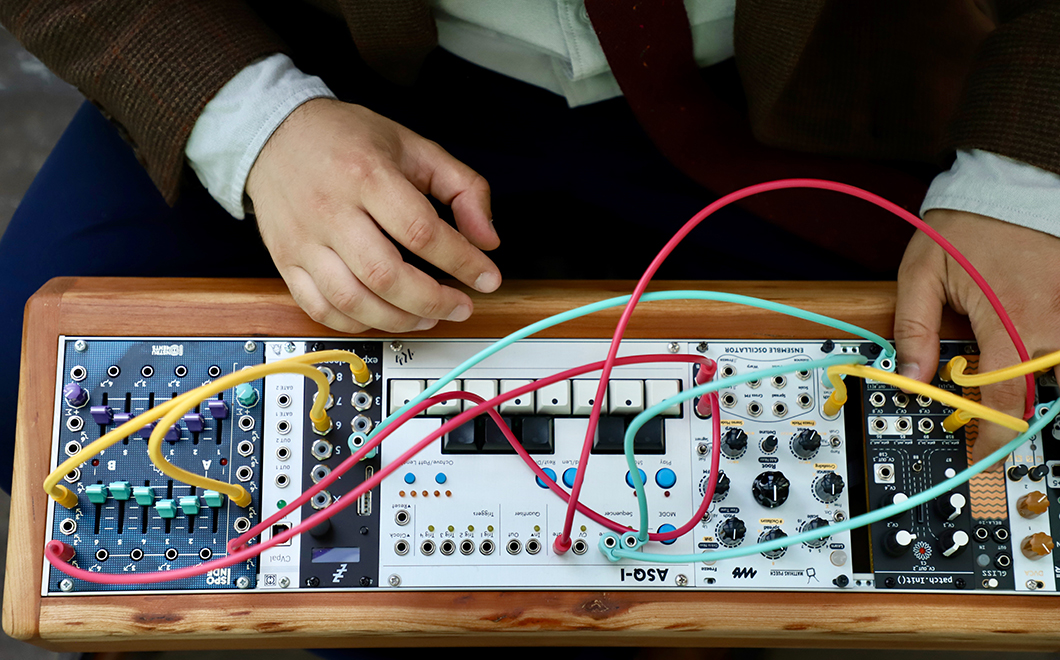The Michigan State University College of Music is proud to announce the addition of Anthony T. Marasco to its esteemed Composition faculty. Marasco, an innovative and versatile composer, brings a unique blend of traditional composition skills and cutting-edge electronic music techniques to the college.
As Assistant Professor of Music Composition and Technology, he will bring his expertise in using computers as musical instruments, opening new avenues for both students and faculty while fostering a dynamic and forward-thinking educational environment. Marasco said that he takes influence from today’s Digimodernist culture.

“Just like many of our students and faculty members in the composition area, I do compose music for performers to be played live on stage,” he explained. “My focus as a composer is writing for computer as a live instrument. This means exploring how a computer can be part of a live musical performance, interacting with other instruments and musicians.”
This innovative approach to music is not merely about convenience or problem-solving; it is about pushing the boundaries of what is possible in live performance.
“The benefit of having a computer involved is that you don’t necessarily always need a human there. Some of my work explores this interaction: how can a computer be part of a live musical performance? How do we as musicians write for a computer to be a live instrument?”
Marasco’s teaching philosophy is equally forward-thinking. He is dedicated to helping students explore ideas and expand their musical horizons.
“It’s important for our students today to understand that the tools they have can make the use of a computer more musically fluent and expressive,” he said. “Even if nobody ever sees them performing with the computer, they are still capable of creating deeply musical and expressive works.”
Beyond composition, Marasco is also known for creating innovative musical tools. He develops custom-made instruments embedded with computers, which allow for new forms of musical expression.
“In addition to composing, I’m also developing software and custom-made instruments. These tools allow for more expressive interaction, enabling musicians to create sounds that can be changed and modified instantly.”
Prestigious venues and conferences worldwide have featured Marasco’s work, including the Society for Electro-Acoustic Music in the United States (SEAMUS) conference, the Networked Music Festival, the MoxSonic Festival, and the Toronto International Electroacoustic Symposium. He was the grand-prize winner of the 2013 UnCaged Toy Piano Festival’s Call for Scores and has received commissions from WIRED Magazine, the Elm Trio, and Quince Contemporary Vocal Ensemble, among others.
Reflecting on his journey, Marasco recalls his own experiences as a student. It was then he became motivated to figure out how creators made certain sounds he found interesting.
“When I was in undergrad, I started writing traditional acoustic music for instruments and singers. At the same time, I was listening to a lot of classic rock and became fascinated by the synthesizers used in the 70s and 80s. This dual interest in acoustic and electronic music has shaped my approach to composition and teaching.”
Marasco’s addition to the MSU College of Music is a testament to the institution’s commitment to providing students with a comprehensive and contemporary music education. His presence will undoubtedly inspire students to explore new musical territories and develop their own unique voices.
“Anthony T. Marasco is a visionary composer, sound artist, and instrument designer, who brings a unique perspective and a wealth of experience to the College of Music. His creative work often brings new technologies into conversation with older devices and practices, exploring the complexities of contemporary life in ways that are extraordinarily thoughtful, engaging, and even playful,” said Chair of the Composition Area David Biedenbender. “Dr. Marasco is also an experienced teacher, and his passion and curiosity resonated deeply with students and faculty alike during his interview. We are so excited by the energy and collaborative spirit that he brings to the College.”
As a researcher, Marasco develops collaborative and networked performance tools for electroacoustic music performance. He is a co-developer of Collab-Hub, a framework that lets remote, physically distanced performers share control of virtual and tangible instruments across the internet. His Bendit_I/O framework extends techniques native to the practices of telematic and network art to hacked hardware, incorporating old devices into new realities.
“Because the computer is so versatile, we can really ask a bunch of questions about what we do with this thing and have a lot of answers come back,” he said.
With his experience and forward-thinking approach, Marasco is poised to have a significant impact on students as he encourages them to embrace the limitless possibilities at the intersection of music and technology.
“The computer is not just here to make something easier,” Marasco said. “It’s here to be in the spotlight.”



